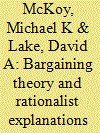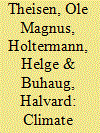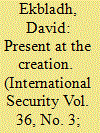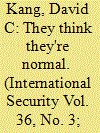|
|
|
Sort Order |
|
|
|
Items / Page
|
|
|
|
|
|
|
| Srl | Item |
| 1 |
ID:
108846


|
|
|
| 2 |
ID:
108841


|
|
|
|
|
| Publication |
2011-12.
|
| Summary/Abstract |
Two assumptions dominate current foreign policy debates in the United States and China. First, the United States is in decline relative to China. Second, much of this decline is the result of globalization and the hegemonic burdens the United States bears to sustain globalization. Both of these assumptions are wrong. The United States is not in decline; in fact, it is now wealthier, more innovative, and more militarily powerful compared to China than it was in 1991. Moreover, globalization and hegemony do not erode U.S. power; they reinforce it. The United States derives competitive advantages from its hegemonic position, and globalization allows it to exploit these advantages, attracting economic activity and manipulating the international system to its benefit. The United States should therefore continue to prop up the global economy and maintain a robust diplomatic and military presence abroad.
|
|
|
|
|
|
|
|
|
|
|
|
|
|
|
|
| 3 |
ID:
108847


|
|
|
| 4 |
ID:
108842


|
|
|
|
|
| Publication |
2011-12.
|
| Summary/Abstract |
Dominant climate models suggest that large parts of Africa will experience greater climatic variability and increasing rates of drought in coming decades. This could have severe societal consequences, because the economies and food supplies of most African countries depend on rain-fed agriculture. According to leading environmental security scholars, policymakers, and nongovernmental organizations, an increase in scarcity-driven armed conflicts should also be expected. A conditional theory of environmental conflict predicts that drought increases the risk of civil war primarily when it strikes vulnerable and politically marginalized populations in agrarian societies. However, an empirical evaluation of this general proposition through a unique gridded dataset of postcolonial Africa, which combines high-resolution meteorological data with georeferenced data on civil war onset and the local ethnopolitical context, shows little evidence of a drought-conflict connection. Instead, the local risk of civil war can be explained by sociopolitical and geographic factors: a politically marginalized population, high infant mortality, proximity to international borders, and high local population density.
|
|
|
|
|
|
|
|
|
|
|
|
|
|
|
|
| 5 |
ID:
108844


|
|
|
|
|
| Publication |
2011-12.
|
| Summary/Abstract |
Security studies, as an American field of inquiry, has particular historical origins. Contrary to standard views, it was the unraveling of the international order in the 1930s that compelled a collection of internationalist institutions and individuals, led by historian Edward Mead Earle, to bind together a variety of new and traditional disciplines to create an entirely new field focused on the problem of security. These institutions and individuals not only sought to confront the crisis at hand by influencing public views, altering academic discussion, enhancing government capacity, and creating an American "grand strategy," but also to establish strong institutional and intellectual foundations for an enduring scholarly project that would contended with future national security problems generated by the modern world. In this effort, Earle and his foundation, government, and university collaborators had significant influence on the evolution of security studies as a field that are still felt today.
|
|
|
|
|
|
|
|
|
|
|
|
|
|
|
|
| 6 |
ID:
108845


|
|
|
|
|
| Publication |
2011-12.
|
| Summary/Abstract |
A wave of recent scholarship, built on rich empirical research, provides new perspectives on enduring questions about North Korea. Three books, in particular-Patrick McEachern's Inside the Red Box, Stephan Haggard and Marcus Noland's Famine in North Korea, and Suk-Young Kim's Illusive Utopia-present a comprehensive and panoramic vision of North Korea today. This essay reviews these books and makes two overarching arguments. First, North Korea is more "normal" than is often thought, and its domestic politics, economy, and society function in ways familiar to other countries around the world. When viewed from the inside out, North Korea's institutions, economic life, and its people act in ways that are not only similar to those of others around the world, but that differ only in their level of intensity. Second, North Korea's continuing nuclear and military challenge is only one aspect of its overall relations with the world, and policies designed to minimize its threatening military behavior may work at cross-purposes with policies designed to improve its economy and the lives of its people. The complexities that arise in dealing with North Korea create a number of contradictory policy choices, and making progress on one issue has often meant overlooking another, or even allowing it to become worse.
|
|
|
|
|
|
|
|
|
|
|
|
|
|
|
|
| 7 |
ID:
108840


|
|
|
|
|
| Publication |
2011-12.
|
| Summary/Abstract |
The United States has been at war for thirteen of the twenty-two years since the Cold War ended and the world became unipolar. Still, the consensual view among international relations theorists is that unipolarity is peaceful. They base this view on two assumptions: first, the unipole will guarantee the global status quo and, second, no state will balance against it. Both assumptions are problematic. First, the unipole may disengage from a particular region, thus removing constraints on regional conflicts. Second, if the unipole remains engaged in the world, those minor powers that decide not to accommodate it will be unable to find a great power sponsor. Placed in this situation of extreme self-help, they will try to revise the status quo in their favor, a dynamic that is likely to trigger conflict with the unipole. Therefore, neither the structure of a unipolar world nor U.S. strategic choices clearly benefit the overall prospects for peace. For the world as a whole, unipolarity makes conflict likely. For the unipole, it presents a difficult choice between disengagement and frequent conflict. In neither case will the unipole be able to easily convert its power into favorable outcomes peacefully.
|
|
|
|
|
|
|
|
|
|
|
|
|
|
|
|
|
|
|
|
|